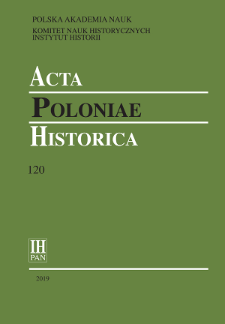- Search in all Repository
- Literature and maps
- Archeology
- Mills database
- Natural sciences
Advanced search
Advanced search
Advanced search
Advanced search
Advanced search

Object
Title: Inconvenient Anniversary: October Revolution Day in the Polish People’s Republic, 1957–67
Subtitle:
Acta Poloniae Historica T. 120 (2019), Studies
Contributor:
Instytut Historii Polskiej Akademii Nauk
Publisher:
Place of publishing:
Description:
Type of object:
Abstract:
This article shows how the leaders of the Polish United Workers’ Party (PZPR) tried to incorporate the October Revolution into the Polish culture of remembrance. The author concentrates his attention on two round anniversaries (in 1957 and 1967) and describes the limits, zig-zags, and paradoxes of the official politics of memory conducted by the PZPR. He argues that although the Soviet leaders conceived the anniversaries of the October Revolution as a means of strengthening the friendship between the nations, in the case of Poland, they created an opportunity to advance arguments for easing Soviet domination. The author also points out that both the Soviet and Polish cultures of remembrances shared one feature in common: by the late 1960s, the theme of the Second World War started to overshadow all other events from the past, including first and foremost the October Revolution.
References:
Olick Jeffrey K., The Politics of Regret: On Collective Memory and Historical Responsibility (New York, 2007)
Osęka Piotr, Rytuały stalinizmu: Oficjalne święta i uroczystości rocznicowe w Polsce 1944–1956 (Warszawa, 2007)
Wolfrum Edgar, ‘Erinnerungskultur und Geschichtspolitik als Forschungsfelder‘, in Jan Scheunemann (ed.), Reformation und Bauernkrieg. Erinnerungskultur und Geschichtspolitik im geteilten Deutschland (Leipzig, 2010)
Babiracki Patryk, Soviet Soft Power in Poland: Culture and the Making of Stalin’s New Empire, 1943–1957 (Chapel Hill, NC, 2015)
Paczkowski Andrzej, The Spring Will Be Ours: Poland and the Poles From Occupation to Freedom (University Park, PA, 2003)
Zaremba Marcin, Komunizm, legitymizacja, nacjonalizm. Nacjonalistyczna legitymizacja władzy komunistycznej w Polsce (Warszawa, 2001)
Kochanowski Jerzy, Rewolucja międzypaździernikowa. Polska 1956–1957 (Warszawa, 2017).
Jones Polly, Myth, Memory, Trauma: Rethinking the Stalinist Past in the Soviet Union, 1953–70 (Yale, 2013)
Behrends Jan C., ‘Nation and Empire: Dilemmas of Legitimacy during Stalinism in Poland (1941–1956)’, Nationalities Papers, 4 (2009), 443–66
De Cesari Chiara and Rigney Ann (eds.), Transnational Memory: Circulation, Articulation, Scales (Berlin, 2016)
Relation:
Volume:
Start page:
End page:
Detailed Resource Type:
Format:
Resource Identifier:
oai:rcin.org.pl:116515 ; 0001-6829 ; 2450-8462 ; 10.12775/APH.2019.120.06
Source:
IH PAN, sygn. A.295/120 Podr. ; IH PAN, sygn. A.296/120 ; click here to follow the link
Language:
Rights:
Licencja Creative Commons Uznanie autorstwa-Bez utworów zależnych 4.0
Terms of use:
Zasób chroniony prawem autorskim. [CC BY-ND 4.0 Międzynarodowe] Korzystanie dozwolone zgodnie z licencją Creative Commons Uznanie autorstwa-Bez utworów zależnych 4.0, której pełne postanowienia dostępne są pod adresem: ; -
Digitizing institution:
Instytut Historii Polskiej Akademii Nauk
Original in:
Biblioteka Instytutu Historii PAN
Projects co-financed by:
Ministra Nauki i Szkolnictwa Wyższego ; Narodowy Program Rozwoju Humanistyki
Access:
Object collections:
- Digital Repository of Scientific Institutes > Partners' collections > Institute of History PAS > Serials
- Digital Repository of Scientific Institutes > Partners' collections > Institute of History PAS > Institute Publications
- Digital Repository of Scientific Institutes > Partners' collections > Institute of History PAS > Institute Publications > Journals
- Digital Repository of Scientific Institutes > Partners' collections > Institute of History PAS > Institute Publications > Journals > Acta Poloniae Historica
- Digital Repository of Scientific Institutes > Literature > Journals/Articles
Last modified:
Oct 29, 2024
In our library since:
Mar 9, 2020
Number of object content downloads / hits:
178
All available object's versions:
https://rcin.org.pl./publication/144452
Show description in RDF format:
Show description in RDFa format:
Show description in OAI-PMH format:
| Edition name | Date |
|---|---|
| Gajos, Bartłomiej, Inconvenient Anniversary: October Revolution Day in the Polish People’s Republic, 1957–67 | Oct 29, 2024 |
Objects Similar
Werblan, Andrzej (1924– )
Chojnowski, Andrzej (1945– )
Żak, Marek (1989– )
Jarząbek, Wanda (1969– )
Zaćmiński, Andrzej
Werblan, Andrzej (1924– )
Chojnowski, Andrzej (1945– )
Eisler, Jerzy (1952– )

 INSTYTUT ARCHEOLOGII I ETNOLOGII POLSKIEJ AKADEMII NAUK
INSTYTUT ARCHEOLOGII I ETNOLOGII POLSKIEJ AKADEMII NAUK
 INSTYTUT BADAŃ LITERACKICH POLSKIEJ AKADEMII NAUK
INSTYTUT BADAŃ LITERACKICH POLSKIEJ AKADEMII NAUK
 INSTYTUT BADAWCZY LEŚNICTWA
INSTYTUT BADAWCZY LEŚNICTWA
 INSTYTUT BIOLOGII DOŚWIADCZALNEJ IM. MARCELEGO NENCKIEGO POLSKIEJ AKADEMII NAUK
INSTYTUT BIOLOGII DOŚWIADCZALNEJ IM. MARCELEGO NENCKIEGO POLSKIEJ AKADEMII NAUK
 INSTYTUT BIOLOGII SSAKÓW POLSKIEJ AKADEMII NAUK
INSTYTUT BIOLOGII SSAKÓW POLSKIEJ AKADEMII NAUK
 INSTYTUT CHEMII FIZYCZNEJ PAN
INSTYTUT CHEMII FIZYCZNEJ PAN
 INSTYTUT CHEMII ORGANICZNEJ PAN
INSTYTUT CHEMII ORGANICZNEJ PAN
 INSTYTUT FILOZOFII I SOCJOLOGII PAN
INSTYTUT FILOZOFII I SOCJOLOGII PAN
 INSTYTUT GEOGRAFII I PRZESTRZENNEGO ZAGOSPODAROWANIA PAN
INSTYTUT GEOGRAFII I PRZESTRZENNEGO ZAGOSPODAROWANIA PAN
 INSTYTUT HISTORII im. TADEUSZA MANTEUFFLA POLSKIEJ AKADEMII NAUK
INSTYTUT HISTORII im. TADEUSZA MANTEUFFLA POLSKIEJ AKADEMII NAUK
 INSTYTUT JĘZYKA POLSKIEGO POLSKIEJ AKADEMII NAUK
INSTYTUT JĘZYKA POLSKIEGO POLSKIEJ AKADEMII NAUK
 INSTYTUT MATEMATYCZNY PAN
INSTYTUT MATEMATYCZNY PAN
 INSTYTUT MEDYCYNY DOŚWIADCZALNEJ I KLINICZNEJ IM.MIROSŁAWA MOSSAKOWSKIEGO POLSKIEJ AKADEMII NAUK
INSTYTUT MEDYCYNY DOŚWIADCZALNEJ I KLINICZNEJ IM.MIROSŁAWA MOSSAKOWSKIEGO POLSKIEJ AKADEMII NAUK
 INSTYTUT PODSTAWOWYCH PROBLEMÓW TECHNIKI PAN
INSTYTUT PODSTAWOWYCH PROBLEMÓW TECHNIKI PAN
 INSTYTUT SLAWISTYKI PAN
INSTYTUT SLAWISTYKI PAN
 SIEĆ BADAWCZA ŁUKASIEWICZ - INSTYTUT TECHNOLOGII MATERIAŁÓW ELEKTRONICZNYCH
SIEĆ BADAWCZA ŁUKASIEWICZ - INSTYTUT TECHNOLOGII MATERIAŁÓW ELEKTRONICZNYCH
 MUZEUM I INSTYTUT ZOOLOGII POLSKIEJ AKADEMII NAUK
MUZEUM I INSTYTUT ZOOLOGII POLSKIEJ AKADEMII NAUK
 INSTYTUT BADAŃ SYSTEMOWYCH PAN
INSTYTUT BADAŃ SYSTEMOWYCH PAN
 INSTYTUT BOTANIKI IM. WŁADYSŁAWA SZAFERA POLSKIEJ AKADEMII NAUK
INSTYTUT BOTANIKI IM. WŁADYSŁAWA SZAFERA POLSKIEJ AKADEMII NAUK


































